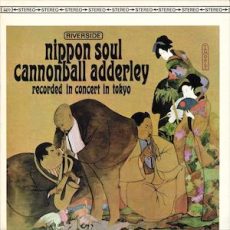
Requisites
Nippon Soul ~ Cannonball Adderley Sextet | By Eddie Carter
This morning’s discussion is about an album I first heard when I lived in Cincinnati, Ohio, in 1988. Two of my favorite record shops to visit each weekend were Everybody’s Records and Record Theatre. At the latter store, Nippon Soul (Riverside RM 477/RS 9477) by The Cannonball Adderley Sextet was playing over the loudspeakers, which blew me away, and I picked it up immediately. It was recorded during the group’s first Japanese tour in July 1963 at Tokyo’s Sankei Hall and released the following year. The personnel is Nat Adderley on cornet, Julian “Cannonball” Adderley on alto sax, Yusef Lateef on flute (track: A1), oboe (track: B3), and tenor sax (tracks: A2, A3, B1, B2), Joe Zawinul on piano, Sam Jones on bass, and Louis Hayes on drums. My copy is the 1966 US Stereo reissue (Riverside RLP 9477).
Side One opens with Cannonball’s introduction of the title tune, Nippon Soul, an original by the altoist that begins with the sextet’s carefree melody. Nat sets the solos in motion with an infectiously swinging interpretation; then, Cannonball delivers a statement of delightful pleasure. Yusef’s flute compliments both horns on the following performance, and Joe scores a direct hit in the closer ahead of the theme’s reprise and ending. Cole Porter’s jazz standard, Easy To Love, moves briskly from the two-instrument introduction by Cannonball and Louis into the ensemble’s rapid delivery of the melody. Cannonball takes off like a race car covering a great distance in the opening solo, then engages in a vigorous exchange with Hayes into the sextet’s closing chorus, ending abruptly.
The first side finale, The Weaver by Yusef Lateef, is a dedication to a friend, Lee Weaver. Cannonball briefly introduces the song; then, the rhythm section gives an exhilarating introduction featuring each of the horns in the melody. Cannonball opens the solos energetically, then Yusef’s tenor sax enters slowly but expands into an ambitious performance of fierce intensity. Nat delivers an equal amount of heat on the following statement, and Joe enters the spotlight last with a lively aggressiveness preceding the ensemble’s quick reprise and climax. Side Two starts with Tengo Tango, Julian, and Nat’s original that’s suitable for dancing. The sextet opens the melody collectively; then, Cannonball gives a funky solo before the theme returns and the dance ends.
Come Sunday by Duke Ellington comes from his Black, Brown, and Beige suite. It opens with a gorgeous duet between Joe and Sam, the featured performers in this rendition. Joe shows a light touch in his playing that characterizes the beauty of this song to perfection, complimented by Sam’s bass and the front line’s subtle support into a tender ending. Brother John by Yusef Lateef is his tribute to John Coltrane and features him on the oboe as he leads the group through the melody. Yusef takes flight first with an adventurous opening solo. Afterward, Cannonball briefly comments, then Nat blazes into the second statement with considerable agility. Cannonball follows with a swiftly paced presentation, and Joe has one of his best moments ahead of Yusef’s theme restatement and finale.
Orrin Keepnews produced Nippon Soul, but who recorded the album is unknown. However, don’t let that dissuade you. The sound quality is exquisite, with an excellent soundstage that places the listener in the Sankei Hall audience as the musicians perform. If you’re a Cannonball Adderley fan, I invite you to check out Nippon Soul the next time you’re out vinyl shopping. It’s a fantastic set capturing The Cannonball Adderley Sextet at the top of their game, and despite being sixty years old, it sounds as fresh today as when it was first released. This album also complements their New York and San Francisco live releases and is highly recommended for a spot in your library!
~ Jazz Workshop Revisited (Riverside RM 444/RS 9444), The Cannonball Adderley Sextet in New York (Riverside RLP 404/RLP 9404) – Source: Discogs.com ~ Come Sunday, Easy To Love – Source: JazzStandards.com © 2023 by Edward Thomas Carter
More Posts: choice,classic,collectible,collector,history,instrumental,jazz,music,saxophone


